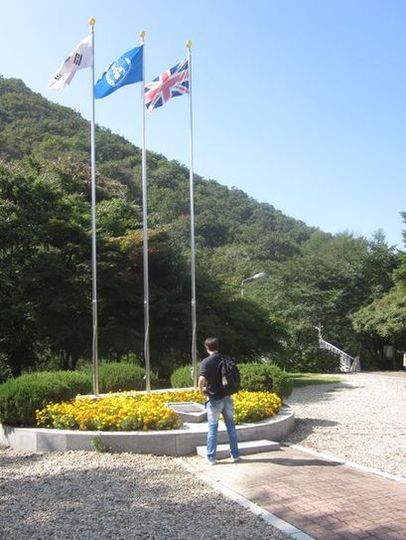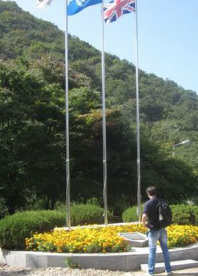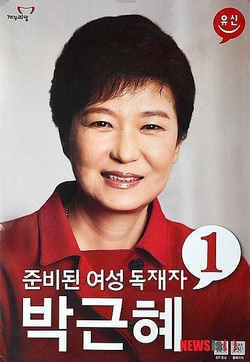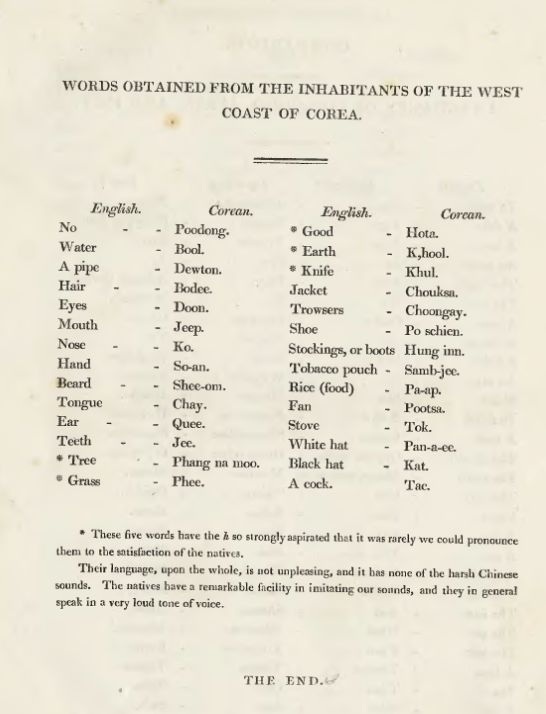Maybe
Post-1‘s photo deserves some explanation.
Here goes:

The photo at right was taken on Chuseok Day, 2012. A pleasantly-warm fall day.
Chuseok is a Korean holiday similar to Thanksgiving Day in the USA. Everyone who is anyone is off work.
Jared and I made a trip out to Paju, the mostly-rural area between Seoul and the DMZ. The first stop was his old, now-abandoned, U.S. Army base. Then we headed towards a place called Gamak Mountain, deep in rural Paju, which we ultimately didn’t fully ascend. No matter. Also in the area was a Buddhist temple (which seemed abandoned, as all temples do, though we did see one monk peeing off a steep hill). A bit up the road from the temple and trailhead up Gamak Mountain was the place you see at right: A monument to the three-day-stand of the Gloucestershire Regiment in the Korean War. (See Jared’s account of this trip).
The Loss of the Gloucester Battaltion
I found this interesting: In April of 1951, the Chinese Spring Offensive began. The Gloster Battalion — a British unit of 750 men — was at the front in Paju. It was quickly encircled around a particular hill, at the base of which there today stands a park and monument in its honor. It was a terrible 60 hours of constant fighting, and finally surrender. Ninety percent the battalion was killed or captured.
The flags you can see in the picture are in this memorial park: The ROK [South Korea] flag, UN flag, and UK flag.
The park is pleasant, with lots of shade, picnic tables, flowers, and war-related curiosities. There is a certain peaceful solemnity to the place, which I guess is the point.
The day we were there, the major holiday of Chuseok, several families were around, and though the place has a distinct picnicking ambiance, we were the only ones eating anything — the Koreans were probably stuffed full of Chuseok food. (Our ‘Chuseok food’: peanut-butter-and-jelly sandwiches and apples — energy food. We’d been walking a lot already and were tired).
[Read much more here]
The battle account fascinates me, as it did the public in 1951, it seems. One synopsis of the battle has it this way:
The Gloster Regiment’s Defensive Stand in Paju
In April, 1951, the Chinese Spring Offensive began, which threatened Seoul. The Gloster regiment
of about 700 men from the UK held off the Chinese 63rd Division, of 10,000 men, for three
days in a valley outside of Jeoksong village. By the morning of 25 April 1951, only 67 soldiers were
able to escape the Chinese encirclement. The remaining soldiers were either killed or captured
by the Chinese. Their heroic defense of the valley prevented the UN forces, who were withdrawing
south towards Seoul through the Uijongbu corridor, from being flanked by the Chinese division. [Link]
It was this kind of action that prevented a loss outright in the Korean War following the Chinese intervention.
I read the autobiography of General Paik Sun-Yup (백선엽, born in 1920, “the R.O.K.’s first four-star general”). He was normally exuberant and kinetic, always actively on-the-ball. Yet he recounts how he sank into an (uncharacteristic) deep depression when the Chinese crossed the Imjin River again in January 1951. He had to be dragged out of his command post chair by a subordinate to evacuate, as the Chinese fast approached. He was genuinely concerned that the Chinese would completely win the war in early 1951. Their winter offensive did recapture Seoul, but was stopped to the south, and Seoul traded hands yet again. In April, General Paik recounts that it was clear that the USA/UN were wavering on whether they wanted to take so many personnel losses in such a wild see-saw of a war.
In the end, the Chinese Spring Offensive failed. UN resistance had a backbone, unlike in summer 1950, and unlike the early days of the Chinese intervention in late 1950 and early 1951.
(The Battle of Gloster Hill seems to me a actually a smaller version of Chipyongni, a decisive battle I read about occuring on my birthday in 1951. I’ve located the site of Chipyongni (지평리 in Hanguel) in north-central South Korea. I will write more about this at a later time, and hope to visit one day).
_____________________________________________________________________________

Pensive
I seem to be in a pensive mood in that picture. I don’t remember it being taken.
I do remember being in such a mood at this memorial park. Who wouldn’t be?
Anyway, the Gloster Hill Memorial was a few hours well spent, and a great Chuseok Day. The weather was good. There is more to the memorial than I even had the chance to look at. Many more photos are at the military-themed, Korea-focused blog ROK-Drop.
_____________________________________________________________________________
Update, April 2013:
A longer, maybe more coherent post about the Battle of Gloster Hill is at post-40.





